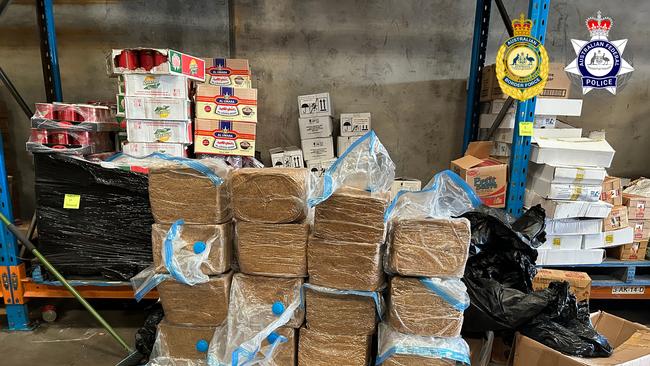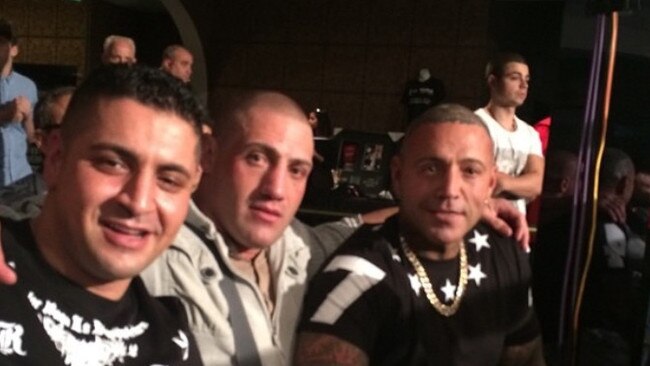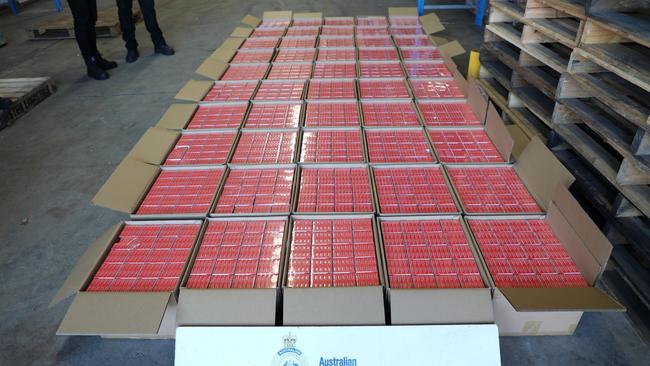Organised crime group behind illegal tobacco now fuelling Australian vape boom
An organised crime group behind an illicit tobacco turf war that has erupted into violence are now behind the vape trade that is fuelling tension between rival gangs. See the exclusive pictures.
True Crime
Don't miss out on the headlines from True Crime. Followed categories will be added to My News.
The same Middle Eastern organised crime groups that dominate illegal tobacco are fuelling an Australian vape boom that preys on children, Border Force says.
In a bid to curb a flow of vapes estimated at $1bn a year that is feeding a violent turf war between rival criminal gangs, the force plans to use new laws to beef-up cargo inspections at the border and will station officers overseas to stop the products at their source.
Many of the vapes coming into Australia appear to target children with cartoon artwork and flavours including “juicy peach ice” and “strawberry banana”.
Deputy commissioner Tim Fitzgerald said new rules prohibiting the import of all disposable vapes from January 1 would make seizing products easier and allow Border Force to “target the higher end” of organised crime syndicates bringing the devices into Australia.

Health Minister Mark Butler has given Border Force $25m over two years to fund the crackdown.
“Vaping is creating a whole new generation of nicotine dependency in our community,” he told News Corp.
“It poses a major threat to Australia’s success in tobacco control and the Albanese Government is not going to stand by and let this happen.”
Price lists obtained from Chinese manufacturers show that 500-puff disposable vapes can be bought wholesale for as little as $2.50 each and sold in shops for more than five times as much.
“That’s why you’ve got organised crime groups involved in it,” Mr Fitzgerald said.

“Simply wherever they can make a profit, they will engage in the importation and then ultimately the distribution.”
He said organised crime controlled about 75 per cent of the illicit tobacco market in Australia, fuelling a wave of arson and violence.
In Victoria, at least 30 tobacco shops have been firebombed over the past 12 months in a war for control of the lucrative trade between the rival Marrogi and Hamad crime groups.
The Marrogi group, Notorious Crime Family, is headed by jailed murderer George Marrogi while the Hamad group is run by Kazem “Kaz” Hamad from Dubai, where he lives since being deported from Australia last year after serving time for importing heroin.

An arsonist set himself on fire in one late night firebombing in October, caught in the fireball after he lit up a tobacco and vape shop in Melbourne suburb Glenroy.
Since October, the Victoria Police taskforce formed in response to the war, Lunar, has seized more than 100,000 vapes alongside drugs, cash and illicit tobacco.
Links to serious crime are also alleged in a NSW case where authorities last year froze more than $500,000 in assets belonging to a Queensland vape shop owner who cannot be named.
Mr Fitzgerald said intelligence from joint operations between Border Force and state police forces provided an “evidence base that we can confidently say organised crime are involved in the illicit vape market”.

In a joint operation with the Therapeutic Goods Authority in early November, Border Force seized more than 35 tonnes of vapes, worth more than $11m.
Mr Fitzgerald said this was “the tip of the iceberg”.
He said the market had grown extremely quickly and many vapes “with cartoon characters on the outside and the range of flavours that are available, are obviously targeting children”.
Mr Fitzgerald said Border Force will use the extra funding to put officers in the markets where vapes come from – China, New Zealand, Japan and Sweden.
“So that will try to stem the supply more broadly, which will obviously impact at the border hopefully over a period of time – and then the ability of organised crime to actually get their hands on these vapes,” he said.

He said Border Force also plans to increase screening of air cargo, which is the main way vapes are imported, and sea cargo.
The ban on disposable vapes is the first step in the Albanese government’s plan to curb the industry.
From March, flavours and packaging that appeals to kids will be banned and import will require permission from the TGA.
The Health Minister slammed vape makers for selling products “using flavours like bubblegum and disguised deliberately as highlighter pens or USB sticks for students to hide in their pencil case”.
This was contrary to how vaping was initially sold to governments “around the world as a therapeutic product to help long-term smokers quit”, Mr Butler said.
“The Albanese Government is taking world leading action to stamp out vaping – to protect a new generation of kids from getting hooked on nicotine,” he said
More Coverage
Originally published as Organised crime group behind illegal tobacco now fuelling Australian vape boom




